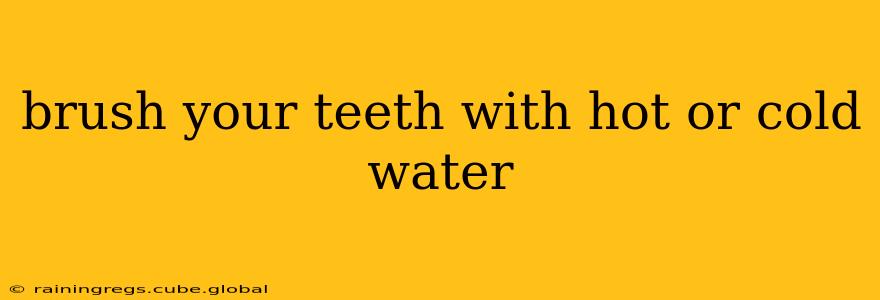The age-old question: should you brush your teeth with hot or cold water? There's no definitive "right" answer endorsed by dental professionals, but understanding the nuances of each can help you make the best choice for your oral health. This article explores the effects of water temperature on brushing, addressing common concerns and myths.
Is it Better to Brush With Cold Water?
Many dentists recommend brushing with lukewarm or cool water. Here's why:
-
Sensitivity: Hot water can exacerbate sensitivity in teeth, particularly those with exposed dentin or existing cavities. The heat can stimulate the nerves within the teeth, causing discomfort and even pain. Cold water, on the other hand, tends to numb the nerves slightly, making brushing a more comfortable experience for those with sensitive teeth.
-
Toothpaste Effectiveness: Cold water helps maintain the integrity of the toothpaste's active ingredients. Some formulations might be affected by higher temperatures, potentially reducing their effectiveness in cleaning and protecting your teeth.
-
Pleasant Brushing Experience: Many find cool water a more refreshing and pleasant experience, encouraging better brushing habits. A positive brushing experience is crucial for consistent oral hygiene.
Should You Brush With Hot Water?
While not generally recommended, there are a few situations where warm water might offer a slight advantage:
-
Stiff Bristles: If you use a toothbrush with stiffer bristles, warm water can slightly soften them, potentially reducing the risk of gum abrasion. However, it's crucial to remember that even with warm water, harsh brushing is detrimental to gum health. It's always better to use a soft-bristled brush with gentle brushing techniques.
-
Relaxation (Prior to Brushing): Some people find that rinsing their mouth with warm water before brushing helps relax their jaw muscles and prepare for a comfortable brushing experience. This is not directly related to the brushing process itself but can improve the overall experience.
What Temperature is Best for Brushing Your Teeth?
The ideal water temperature for brushing your teeth is lukewarm. It avoids the potential drawbacks of both hot and cold water. Lukewarm water offers a comfortable experience without compromising the effectiveness of your toothpaste or causing sensitivity issues.
Does Water Temperature Affect Tooth Enamel?
While extreme temperatures (very hot or very cold) might cause temporary discomfort, there's no scientific evidence to suggest they directly damage tooth enamel. However, consistently using extremely hot water could potentially worsen existing sensitivity issues over time.
Can I Use Mouthwash With Hot or Cold Water?
Similar to brushing, lukewarm water is the best choice for using mouthwash. Extreme temperatures can impact the mouthwash's effectiveness and potentially cause discomfort.
What About Using Other Liquids to Brush?
Using anything other than water to brush your teeth is generally not recommended. Water is crucial for rinsing away food particles and bacteria, and using other liquids could dilute or interfere with your toothpaste's efficacy. Stick to water for the best results.
How Important is Water Temperature Compared to Brushing Technique?
While water temperature plays a minor role, the brushing technique is far more crucial for maintaining good oral health. Gentle, thorough brushing for at least two minutes, twice a day, is paramount. Focus on proper brushing technique rather than getting overly concerned about water temperature.
In conclusion, while the water temperature debate might seem insignificant, choosing lukewarm water offers a balanced approach that optimizes comfort and brushing effectiveness. However, remember that a proper brushing technique consistently applied is the most vital aspect of maintaining healthy teeth and gums.
